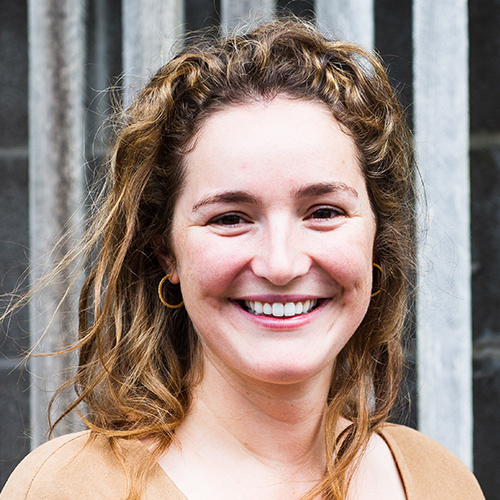Miriam woke. She had slept better than she had in days, which worried her. The sun was already straining through the dirty curtains. Why hadn’t he woken her earlier? She looked down at the baby huddled under her right arm. He was so tiny, and so…cold! The sun’s heat was already warming her face and spilled over onto his, so why was his skin icy? She stroked one cheek with the back of her finger. He didn’t move. He didn’t move!
She grabbed his hands; they were blue. His lower lip was blue too. She was terrified now. Miriam wrenched him out from under the thin blanket and leapt over to the window. She shook him softly – then more urgently, trying to get him to open his eyes. But – nothing! A piercing sound hit her ears and it took her a few seconds to realise it was coming from her mouth.
Through the haze of grief, her roommate Eliza was shaking her shoulders. Behind her she saw Eliza’s baby lying on her narrow bed, crying healthily. Miriam’s wail trailed off. She looked puzzled. Eliza’s baby had that w-shaped wrinkle on his forehead that her son had had when he cried. She looked down at the baby in her arms. The sun was brighter now and she could see in its light that the child in her arms was definitely not her son. Miriam took him over to Eliza’s bed and laid him down gently. Then she turned and gathered her son into her arms. His crying stopped immediately.
A few days later the two women stood before the king. ‘Please Sir! You have to help me! This woman has taken my baby and won’t give him back! He is all I have,’ Miriam said. She told the king how she and Eliza had both given birth to their boys within three days of each other. She told him how they were prostitutes and had no one else in the world but their sons. She told him how Eliza had accidentally smothered her baby in the night and had then got up and switched his little body with Miriam’s baby, and tried to claim that he was hers. Eliza denied it all vehemently. What was the King to do?
Ever since I first heard this story it grabbed me and I wondered, what would I have done in that situation? Would I know which one was telling the truth?
I recently watched Pamela Meyer’s TED Talk ‘How to Spot a Liar’ and realised that many of us are asking the same question.
Meyer says that in an age of increasing deception we need help to determine who is telling the truth, and to recapture the importance of truth-telling as a societal value as well as a personal virtue.
But it’s not just this question that we want guidance on. Several of my recent conversations with friends have covered the more familiar (but no less important) questions of whether they should keep pursuing the relationship they are in, what type of schooling they should enroll their children in, and whether they should move out of the city to the suburbs.
Throughout our lives we will have questions like this that need answers – that need to be thought through, discussed and decided upon. And yet we don’t always tend to give a lot of thought to how we will go about answering them, despite the fact that the decisions we make may very well alter the direction of our lives.
Stories about how to exercise wisdom, like the one above, were common in ancient literature. But we don’t often hear these kinds of tales today. In fact, we rarely talk about wisdom at all. Wisdom, prudence, astuteness, perspicacity: these are words we struggle to spell, let alone to possess. If we think of them at all it is usually in a disparaging tone, as if wary that they might try to suck the joy out of life rather than as something designed to lead us into life in all its fullness.
But if we take a step back, I think we’ll see that the somewhat old-fashioned idea of wisdom is just another word for ‘the answer to the problem I’m facing’ – a good answer that will lead to the best possible outcome in the circumstances.
Wisdom is finding out what that answer is and then acting on it. The recent proliferation of TED Talks and self-help books, and a renewed interest in spiritual matters among millennials, reveal that our earnest search for wisdom in these modern times is very much alive.
We want to know what movements to follow, what things matter and what our priorities should be. We want answers to the daily questions of what we should eat, what clothes we should buy, what job we should be doing, how to do relationships well, how to make the most of our money, and who to vote for.
In short, we want to know how best to live so we can live our best lives.
In the ancient story above, the king thought for a few moments about what to do and then called to his guard to bring him a sword. He asked him to cut the baby in half and give half to each woman. At this, the real mother of the baby fell down at his feet and begged him to give the baby to the other woman instead, to ensure it would survive. Then the king knew which woman was the baby’s real mother, and she was restored to her baby.
That king, King Solomon, went on to write a whole book about the wisdom that he had learned over his life – found in the Hebrew scriptures. He concluded, ‘The fear of the Lord is the beginning of wisdom’. He had come to realise that it was only by knowing God and searching for his way in a given situation that he could make sage decisions. Whatever else he built his life upon, he knew it needed to be rooted in God’s wisdom in order for him to succeed.
For Solomon, and for us, our search for wisdom should be more than just amassing knowledge; we want to know what to base the foundation of our life upon so that we can make good decisions that will lead to us being happy and flourishing. But, at the heart of this search is one question: are we looking for the answers in the right places?





